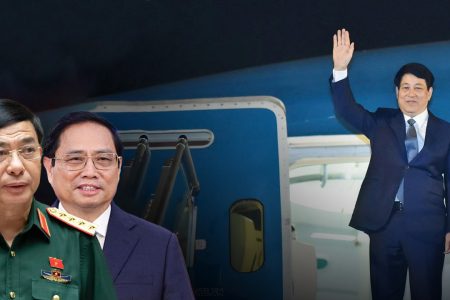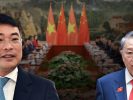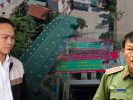
The latest developments at Ream Naval Base in Cambodia, which China is building a base for its military to use, have unsettled Vietnam and Hanoi military strategists who closely follow developments across the border.
Diplomatic sources say the issue of the Ream base and Beijing’s involvement in strategic projects in Cambodia must be on the agenda of meetings of US Deputy Secretary of State Wendy Sherman when she is visiting Vietnam this weekend.
According to the plan, Deputy Secretary Sherman will visit Ho Chi Minh City and Hanoi on June 10-13. She will have meetings with Vietnamese officials including Deputy Prime Minister Le Van Thanh, Foreign Minister Bui Thanh Son, and Deputy Foreign Minister Ha Kim Ngoc.
Sherman will not meet Vietnamese defense officials because of the conflicting schedule. On a similar trip in 2014, Ms. Wendy Sherman met with General Nguyen Chi Vinh, then Vietnam’s deputy defense minister and chief strategist in Cambodia.
At that time, she was the Deputy Secretary in charge of Political Affairs.
Historical relations
Vietnam is not only a neighbor to Cambodia but also its “brother from Indochina” and a traditional ally.
The current Phnom Penh government was set up by Hanoi after the Vietnamese defeated the Khmer Rouge in 1979. Prime Minister Hun Sen, a fluent Vietnamese speaker, is often called a “Vietnamese puppet” by critics in Cambodia. from the very beginning of his political life.
News of a Chinese-supported development project, under which Beijing will help Phnom Penh renovate and upgrade facilities in Ream, shows just how much Vietnamese influence has been lost in Cambodia in recent years.
A Vietnamese analyst, who wished to remain anonymous due to the sensitivity of the matter, said: „Vietnam is, of course, concerned because the Ream base is located very close to the base on Phu Quoc island.“
In fact, the Ream Naval Base in Preah Sihanouk province in southwestern Cambodia on the Gulf of Thailand is less than 30 kilometers from Vietnam’s Phu Quoc island. This island in Khmer is Koh Tral.
It was the Vietnamese Navy that captured Ream base from Pol Pol’s army in January 1979 and handed it over to the new Cambodian government.
However, the Vietnamese Navy has been invited to visit Ream Base a couple of times, and recently the ‚Vietnam Friendship‘ building built by the Hanoi side was moved from the base, reportedly to avoid conflicts with Chinese personnel.
The Vietnamese analyst added: “There was also a big disappointment; however, in my opinion, China’s involvement at this base is not aimed at Vietnam but rather allows the Cambodian government to issue a message of challenge and a warning sign to the United States.“
In July 1982, Hanoi and Phnom Penh signed an agreement on ‚historic waters‘ between the two countries to delimit the maritime boundary and sovereignty over the islands in the Gulf of Thailand. The aim is to minimize misunderstandings and prevent possible conflicts.
The security dilemma
Beijing’s involvement in Ream caused controversy in the West as the United States saw the threat of China acquiring the first naval facility on Southeast Asian soil. This base could allow Beijing to expand patrols throughout the South China Sea.
Concerns about the Ream base date back to 2019 when the Wall Street Journal reported about a secret deal that would have allowed China to lay off personnel, stockpile weapons, and station warships there.
Cambodia and China have always denied that information, saying that ‚the reclamation of the base is only to strengthen Cambodia’s naval capabilities in the work of protecting the integrity of the sea and fighting crimes at sea.
Washington has complained, „about the lack of transparency in the purpose, nature, and scope of this project, as well as the role that the People’s Republic of China military plays in the construction and post-construction uses of this establishment.”
Researcher Sovinda Po at the Cambodia Institute for Peace & Cooperation said: “The latest news about Ream Naval Base is yet another indication that the United States does not accept the fact that Cambodia and China are already a close partners in Southeast Asia. The main reason behind the US’s frequent accusations is to warn the Cambodian government not to befriend China.“
This Cambodian expert further analyzed: „Vietnam is also not happy to see China moving closer to its territory because Hanoi and Beijing are having sovereignty disputes in the South China Sea as well as trust in each other between the two countries is down.”
Expert Sovinda Po believes that the naval base and developments around it thus become a major security dilemma for Cambodia, Vietnam, the United States, and China.
“New normal”
China has the world’s largest sea power with 355 warships and is expected to grow to 460 by 2030. This is according to the latest US Department of Defense report on the Chinese military.
The US side has 297 ships in the combat force but operates at more than 800 overseas military bases.
Singapore-based defense policy expert Blake Herzinger and an American Navy reservist said, „This is the new normal, China will be looking for bases abroad like we do.“
And on Twitter, Blake Herzinger wrote, „If we think excluding countries that choose to cooperate with China will do anything more than making us like them, we are sorely mistaken.“
The U.S.-China relationship has become strained in recent years due to a variety of factors including differences in strategic and geopolitical interests, human rights issues, democracy, and China’s role in the world economy.
In contrast, during the past decade under the so-called Belt and Road Initiative (BRI), China has pumped investment into key infrastructure projects in Cambodia including the Sihanoukville Special Economic Zone, the Phnom Penh Expressway, and the Sihanoukville Special Economic Zone. Penh-Sihanoukville, Siem Reap’s new international airport, roads, bridges, and hydropower plants.
Prime Minister Hun Sen once famously said at a regional forum in 2021: „If I don’t rely on China, who do I rely on? If I don’t ask China, who do I ask?“
“It is time to recognize the very limited US influence in a competitive region where the opposite is the People’s Republic of China (PRC),” said expert Blake Herzinger. Public bullying cannot win Cambodia.”
Thoibao.de (Translated)


























